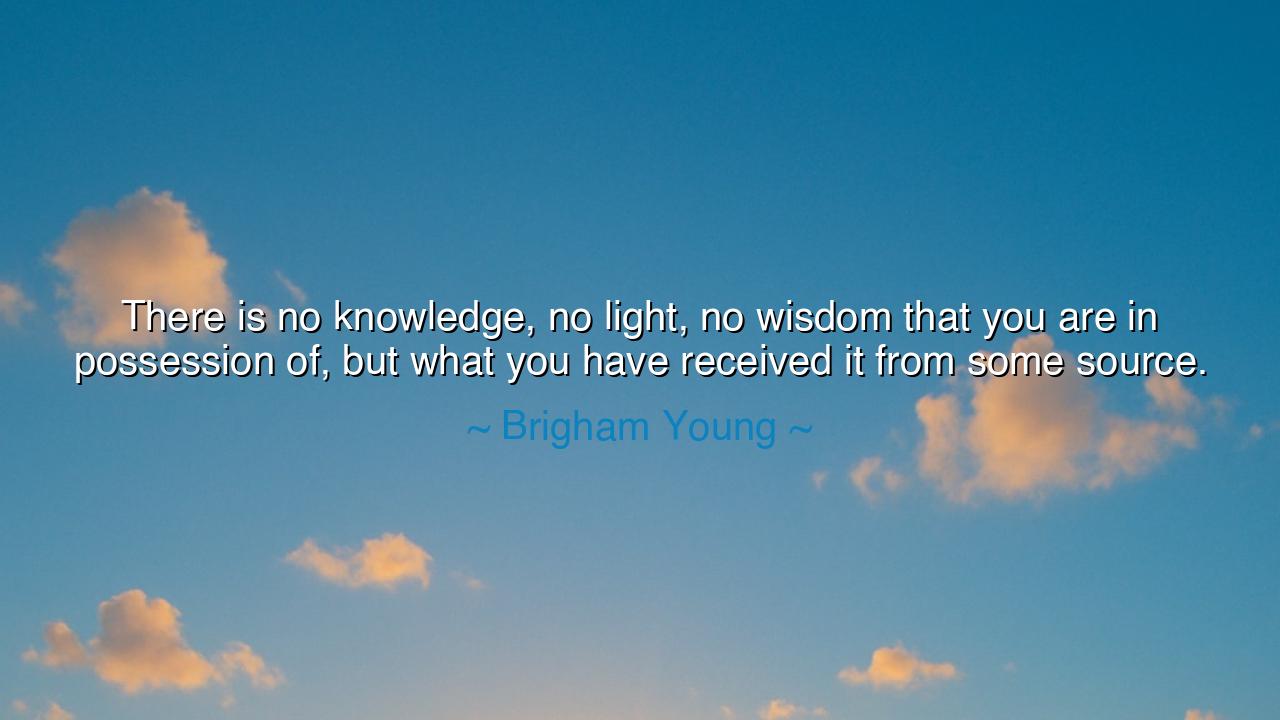
There is no knowledge, no light, no wisdom that you are in
There is no knowledge, no light, no wisdom that you are in possession of, but what you have received it from some source.






When Brigham Young, the early leader of the Church of Jesus Christ of Latter-day Saints, declared, “There is no knowledge, no light, no wisdom that you are in possession of, but what you have received it from some source,” he spoke as a man who understood both the divine and human roots of learning. His words rise like a hymn to humility, a reminder that no truth is born in isolation, no spark of understanding ignites without a flame that came before it. In an age that glorifies self-made wisdom, his statement is a call to reverence—to remember that all knowledge flows from a greater well, and that the wise are not creators of truth, but stewards of revelation.
The origin of this quote lies in Brigham Young’s profound view of learning as both sacred and communal. As the pioneer prophet who led his people across the wilderness to settle the valleys of Utah, he witnessed firsthand that survival, progress, and enlightenment were only possible through shared insight and divine guidance. His life was a living testament to dependence—on God, on nature, on others. For Young, knowledge was never a personal possession; it was a trust, a gift, a sacred inheritance passed from Creator to creation, from teacher to student, from generation to generation. Thus, when he spoke of “some source,” he meant not only God but the vast network of wisdom—spiritual, human, and cosmic—that sustains every soul who seeks understanding.
This teaching echoes through the halls of philosophy and faith alike. The ancients of Greece spoke of the Muses, divine daughters of memory, who whispered inspiration into the hearts of poets and thinkers. The prophets of Israel said that wisdom was not theirs but “the breath of the Almighty” moving through them. Even the scientists of the modern age, standing in laboratories of glass and light, acknowledge that they build upon the shoulders of others. Newton, that giant among minds, humbly admitted, “If I have seen further, it is by standing on the shoulders of giants.” Thus, Young’s statement is no provincial sermon—it is a universal truth: that all enlightenment, whether spiritual or intellectual, is the fruit of connection, not isolation.
Let us look to history for a vivid example of this principle. When the great mathematician Pythagoras traveled through Egypt and Babylon, he sought the wisdom of priests, astronomers, and mystics. He gathered fragments of truth from distant lands, refined them, and carried them home to Greece, where his teachings would shape the future of Western thought. Yet Pythagoras never claimed ownership of truth; he saw himself as a vessel through which divine order flowed. His school was not a place of self-glory but of reverence—a sanctuary where students learned that to know anything truly is to honor the chain of being that brought that knowledge into existence. No light is ever ours alone—it is shared, refracted, reflected through time.
In this, Brigham Young’s words challenge the arrogance of modern minds who believe themselves self-taught, as though truth were a treasure one could mine from within. He reminds us that wisdom is relational. The farmer learns from the soil and the seasons. The child learns from the parent, and the parent from the years. The artist draws from the beauty of creation, the philosopher from the thoughts of the dead. Even our most private insights are shaped by voices we have heard, books we have read, or the quiet whisperings of the divine that stir within the heart. The moment we claim complete originality, we sever ourselves from the river of wisdom that gives all understanding its power.
And yet, there is freedom—not limitation—in this dependence. For if all knowledge is received, then all may receive it. Wisdom is not hoarded in the hands of a few but offered to all who seek earnestly and humbly. The scholar kneeling in study, the laborer meditating on the mysteries of the earth, the child marveling at the stars—all drink from the same fountain. The light of truth, as Brigham Young taught, “is in and through all things.” To recognize that our understanding comes from a source beyond ourselves is not to diminish our worth—it is to connect us to the eternal chain of learning that stretches from the divine to the human and beyond.
Let the lesson of Brigham Young’s words be this: walk through life with gratitude for every teacher, seen or unseen. When you learn, honor the hands that shaped that knowledge before it reached you. When you teach, remember you are a conduit, not a creator—you are passing forward the light entrusted to you. Be humble before wisdom, for it does not belong to you; it belongs to Truth itself, which lends its light freely to those who seek it in sincerity.
And so, to those who would call themselves wise, remember: knowledge is a gift, not a conquest. Every idea you hold is a thread in the vast tapestry of human and divine understanding. Guard it well, share it freely, and trace it back always to its source—for in that remembrance lies the highest form of wisdom: gratitude.






AAdministratorAdministrator
Welcome, honored guests. Please leave a comment, we will respond soon